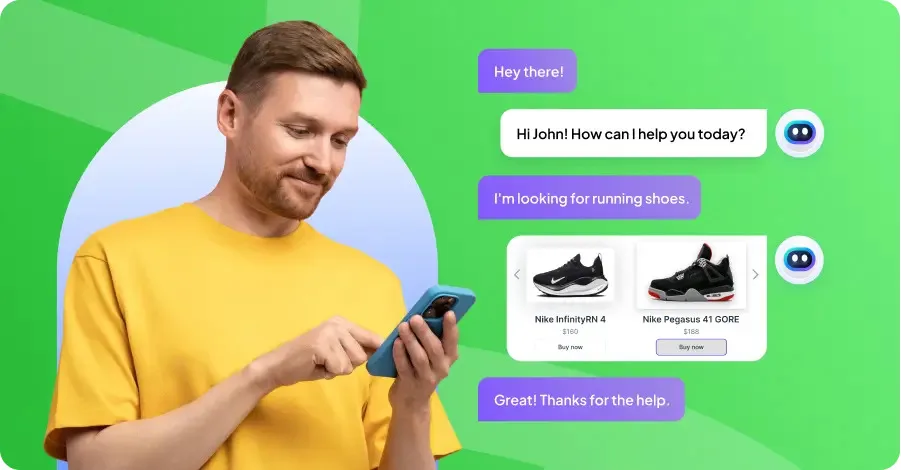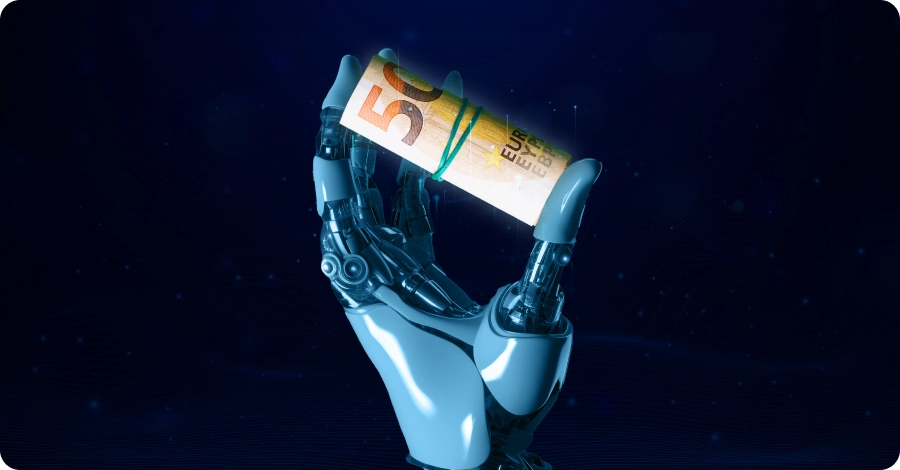5 Best Sales Chatbots to Drive Engagement & Conversions (2025)
- September 1, 2021
- 16 mins read
- Listen

Table of Content
AI chatbots can be great tools for improving the customer experience and boosting sales. Many businesses use them to drive customer satisfaction and loyalty. This was not possible earlier as bots were not advanced then.
The scenario is changed now. Using chatbots for sales is a key strategy that companies across industries perfect. This has happened because modern artificial intelligence chatbots can handle conversations with customers over 69% of the time.
From asking follow-up questions to providing answers, sales chatbots are intelligent and can manage conversations until the customer query is fully resolved. This is why bots are frequently used to streamline the buying experience, offer customers a quick response and nurture leads through the sales funnel.
In this blog, we will explain everything about sales chatbots, discuss how they work, and analyze the top ones with their features and benefits.
What is an AI Sales Chatbot?
An AI sales chatbot is an artificial intelligence (AI)–powered automated software program designed to engage with customers and automate sales-related tasks. It uses the power of NLP ( natural language processing) and ML ( machine learning) technologies to understand customer queries and respond as humans do.
AI sales chatbots can help with various sales activities once they are integrated into websites, messaging apps, or customer service platforms. These bots rely on prewritten scripts or algorithms to simulate human-like communications. So, they can respond to customer queries, offer product information, and guide customers through the sales funnel.
Many businesses today use sales chatbots to improve customer engagement and generate leads through qualifying prospects. Sales teams can save time when bots are used for managing the sales pipeline. They can be available round the clock to help and guide prospects, which can ensure lead qualification.
How Does AI Chatbot for Sales Work?
AI chatbots for sales rely on pre-scripted conversation paths. They combine artificial intelligence (AI) and natural language processing (NLP) functionality to work effectively. These bots are dependent on their programming to deliver relevant responses after recognizing words, phrases, and sentence structures. Additionally, machine learning (ML) is also a key aspect of an AI chatbot for sale as this technology helps it adapt and improve based on previous responses and search patterns.
Let’s look at a detailed understanding of how an AI chatbot for sales works –
- Understanding user queries – Understanding user queries is the first step in how these bots work. NLP is the reason how an AI chatbot for sales can analyze and interpret customer queries.
- Establish the intent behind the message – Once the bot understands user queries, it will then establish the intent behind any message.
- Generate Responses – Once the intent is established, it means the chatbot has understood the query and it can now generate a response. For generating responses, sales chatbots rely on AI models so that the answer is specific to the customer query.
- Improve Responses Over Time – Over time, chatbots become experts by continuously handling interactions and machine learning helps them improve responses.
- Predict User Needs – Since chatbots can analyze past conversations and interactions, it helps them predict user needs more accurately over time, leading to personalizing the experience.
- Access Customer Information – Sales chatbots can be integrated with CRM systems and databases to help them access customer information in detail.
- Lead Qualification – Integration with CRM systems and databases can help the bot effectively do lead qualification by asking prospects key questions.
- Involve Human Agents for Follow-Up – The bots are programmed to work in unison with human agents so that they can handle routine sales queries on their own and pass on the qualified leads to human agents.
- Handle Queries in Real-Time – Sales chatbots can handle customer queries in real-time and also guide them through the sales funnel, all because they rely on pre-programmed scripts.
What are the Benefits of Using Sales Bots?
Chatbots have evolved a great deal in recent years. From once handling basic sales queries, today they are a game changer for sales teams for the ability to handle dynamic conversations. They are a big addition to sales teams looking to engage prospects, qualify leads, and drive conversions.
Here are some of the key benefits of using sales bots –
Automate Customer Support
Chatbots can automate various aspects of the customer support process. They can automate responses to customer queries and ensure real-time access to support. A sales team can trigger a bot for different situations so that it can pop up at any stage of the sales funnel, guiding customers through the funnel.
Provide a Personalized Customer Experience
Customers are more loyal when they get a personalized experience. AI sales chatbot can analyze and learn from past customer interactions. It can also be integrated with CRM systems to access customer information. Based on that, the bot can learn more about audiences, understand their needs better, and provide tailored responses.
Generate Leads
Chatbots can generate leads. They can guide customers having questions or seeking information. A bot can connect customers with your sales teams or also redirect leads to a demo request. For ecommerce setups, the sales chatbot can handle transactions even after working hours and track abandoned carts. You can also use them to suggest cross and upsell opportunities based on previous customer interactions.
Save Time for Sales Staff
Bots are smart enough to handle routine sales queries. They can engage with customers and answer their queries easily, leading to an improved customer experience. At the same time, sales teams will be spared the effort and time to deal with routine queries and rather focus on more important tasks of nurturing leads or closing deals.
Account Prioritization
Today, sales teams rely on chatbots for account prioritization tasks as they don’t want to be engaged with every potential customer. Since AI chatbots are intelligent, they can be programmed to pass over important conversations to human agents. This helps the sales team engage with prospects in the advanced stages of conversions.
How Can AI Chatbot Drive Sales?
Great conversations with customers are always at the center of accelerating leads and growing conversions for any business. Thanks to the AI chatbot marketing features, you can think of delivering great experiences to customers via timely conversations and engaging them with the perfect message, therefore giving a much-needed boost to the sales pipeline.
Here are the ways AI chatbots can drive sales –
1. Pre-qualify Leads 24×7
Chatbots can be a great tool when it comes to optimizing the customer experience and boosting lead generation.
Since bots are conversational and always available, your business can modify them based on the different stages of the customer journey and bolster the lead qualification effort.
However, you first need to build the chatbot for lead generation flow in your chatbot with the relevant questions to ensure better engagement with customers.
It is also important to consider the human touch in building the bot flow to avoid sounding robotic, get more visitors hooked to your website, and generate more leads.
2. Automate Appointment Bookings
Customers like the reservation system via chatbot as it’s fun and quite interactive to book appointments based on availability.
They also like the idea of navigating through a tree of options, answering questions, and getting recommendations for bookings or reservations.
Your business can automate appointment scheduling with chatbots and let visitors self-schedule. It is how you benefit from chatbot use cases and gather data to generate leads for the sales team.
Further, integration of the chatbots with Google Calendar will help you display the available slots to customers and prevent overbooking.
The calendar integration will always ensure that both, you and the lead, receive a timely email invite so that the dates are remembered.
3. Offer Product Recommendations
Most customers look for some help to smoothly proceed through the final stage of the sales funnel.
With quick answers to their queries and a bit of guidance, your business can meet their preferences easily and help them convert.
It is where customer service chatbots can prove extremely helpful as they can engage with customers via conversations, understand their needs better, and then recommend products accordingly.
These chatbots can efficiently guide users and eliminate the need to have a sales agent and at the same time, buyers won’t need to waste their time searching and knowing about the products by themselves.
4. Reduce Cart Abandonment Rate
Cart abandonment is a big issue faced by retailers and the e-commerce industry across the world.
After all, there could be many reasons why customers might leave the purchase mid-way, whether a complex checkout process, poor website navigation, or high shipping costs.
AI chatbots can help reduce cart abandonment by filling the gaps between what customers want and what they should get.
Your business can adeptly use bots to trigger messages at various stages of the sales funnel and stop buyers from ditching the purchase.
5. Offer Multilingual Sales Support
76% of online shoppers want to make purchases in their own language and they would not go ahead at all if this option was not available.
It clearly shows how most of the customers are comfortable conversing in their first language of choice, and English is not always that.
So, if your business is selling products across the globe, it’s going to have customers with different choices for conversations.
In such scenarios, AI chatbots can prove handy as you can program them to offer multi-lingual support and increase your conversions.
When you’re able to help sales sales-related queries in multiple languages, your business can become more accessible and expand to new markets easily.
5 Best Sales Chatbots For Your Business
Finding the best sales chatbots for your business is not easy if you’re not sure what your specific requirements are. From knowing the price range you want to stretch to the problem areas you want to solve, there’s a lot you need to be sure about before finding the best bot for your business.
If you’re in search of a top sales chatbot, make sure you ask a few questions before finalizing the deal –
- Why do you want a chatbot? What problems do you want the bot to solve?
- What channels do you want the bot to work in?
- What budget you’re ready with for the chatbot?
- Will the bot provide scalability to accommodate future needs?
Based on the answers to these questions, you can start the search and hopefully be able to find the kind of sales chatbot your business needs.
Let’s have a look at the 5 best sales chatbots for your business in a detailed manner –
1. REVE Chat
REVE Chat is a feature-rich and advanced AI chatbot to boost customer engagement and drive conversions. It offers a wide range of features that can help you optimize sales processes and improve your sales efforts. It’s a chatbot platform that supports omnichannel communication, so you can engage with prospects across multiple channels, including messaging apps such as WhatsApp.
Your business can use REVE Chatbot to interact, communicate, and engage with customers on their preferred channels. This type of engagement is often the key to improved customer experience and sales conversions. The bot will minimize the burden on your sales team and automate lead qualification tasks. It will also answer sales queries of any type and offer product recommendations.
Key Features
- Real-time Lead Qualification
- Seamless CRM Integration
- Sales Funnel Automation
- Tailored Product Recommendations
- Proactive Messaging
- Analytics & Reporting
2. Zendesk
Zendesk’s Answer Bot is a popular sales support and customer service chatbot. It’s available in 17 different languages and can be a great addition to the sales team looking to solve customer problems easily. Using the bot, the sales team can let AI handle common inquiries while managing more complex issues by themselves. It is designed to handle inputs from multiple channels at one time. The redirect feature is a major highlight of the bot and it can help the sales team meet prospects where they are. It’s ideal with sales support through the website, social media messaging channels, and email.
Key Features
- Elaborate Reporting and Analytics Features
- Seamless Human Handover
- Omnichannel Engagement
- Use of New Language Model
- Compatible Across Many Channels such as chat, email, and messaging
3. Tidio
Tidio is a feature-rich sales chatbot that can help businesses automate customer interactions, boost engagement, and drive sales. The chatbot can answer common sales questions and offer personalized product recommendations. A sales team can use it to send automated reminders to customers and recover lost sales. It combines chatbot and live chat tools into one system which proves helpful in streamlining sales and customer service. You can integrate it into any existing CRM and use its 35 built-in templates.
Key Features
- Real-Time Assistance to Website Visitors
- Product Recommendations Based on Past History and Behavior
- Automated Reminders for Cart Recovery
- Proactive Chat Triggers
- Multichannel Support
- Detailed Analytics and Reporting
4. Drift
Drift is an advanced and feature-rich conversational tool that combines chatbots and live chat for improved sales performance. Using the unique features of the tool, the sales team can create consolidated reports and share them will customers. As a user-friendly chatbot, it can be easily integrated with your existing sales and customer service software. The sales team can use it for real-time conversations with prospects and connect them with salespeople. It can automate much of the sales process and ensure higher conversions for the business.
Key Features
- Automated Responses
- Chat Routing and Live Chat
- CRM Integration
- Data Tracking and Reporting
- A/B testing
- Multiple Languages
- Custom RBAC
5. Intercom
Customer Bots from Intercom can easily integrate with existing software and help businesses automate workflows and sales. These bots can help the sales team with lead qualifications and also answer customer queries in real-time. The sales team can modify these bots to target prospects rather than wait for them to start conversations. Combining automation with real-time chat, the bot helps in capturing leads and guiding users through the sales funnel. You can integrate its various tools and CRM systems to optimize sales strategies.
Key Features
- Advance Reporting
- Support for 30+ languages
- Team Inboxes
- Real-Time Chat and Lead Qualification
- Predictive Answers
- CRM Integrations
How to Build and Implement a Sales Chatbot?
Building and implementing a sales chatbot is a complex process that requires you to adopt a strategic approach to the entire process. You will need a successful sales chatbot strategy to get the most out of your investment.
Here is the three-step process for building and implementing a sales chatbot –
Step 1 – Define What You Want the Chatbot to Achieve
There are a variety of reasons why your sales teams may feel the need for an AI chatbot. Maybe the team is experiencing a slow lead response time or witnessing low conversion rates due to a lack of engagement with users and so on. Whatever problem the sales team is facing, make a list of that and then start the search for a chatbot. Based on the problem areas, you can understand what type of chatbot design to need. The design will play a key role in the purposes of the sale you aim to achieve.
The next step is to –
- Decide the role the chatbot will play in the sales process
- Decide the sales tasks you want to automate using the bot
- Decide how the bot with engage with prospects at different stages of the journey in the sales funnel
Once you are sure about what the chatbot will achieve, you can go ahead and work on designing the conversational flows of the blog. The conversational flow you design will determine the specific tasks the bot will perform like greeting prospects, asking qualifying questions, guiding prospects through their problems, and routing leads to human agents when needed.
Step 2 – Select the Right Chatbot Platform
After defining what you want the chatbot to achieve, you can decide on the platform to build the bot. You will have two options to build a chatbot –
- Select a Ready-to-Use Chatbot Platform
- Select Custom Development
When you select a ready-to-use chatbot platform, you will get pre-defined chatbot templates. The platform will make it easy to build a sales chatbot as per your specific business needs and then deploy it across multiple channels. For example, REVE Chat is a ready-to-use chatbot platform that requires no coding to build the bot.
Here is a detailed guide on how to create a chatbot for your website.
With a chatbot platform builder –
- You will get the capabilities of live chat and chatbot together
- The bot will handle routine sales queries while human agents will manage complex conversations
- There will be comprehensive bot analytics to measure customer satisfaction and train the bot thereafter
The platform will help you create conversation scripts and develop flows for different scenarios. There will be a visual chatbot or bot builder tool to drag and drop conversation paths to design responses. Your chatbot will use natural language processing (NLP) to decode queries from customers and offer meaningful responses.
On the other hand, custom development is ideal for situations when your business requirements are unique, or when you have complex sales use cases to achieve. It’s suitable when you need a chatbot tailored to the specific requirements of a business. Custom chatbot development is the right solution when you need personalized features and smooth integration with business systems.
Step 3 – Integrate with a Third-Party Solution
Implementing a sales chatbot means you need to integrate it with a third-party app or solution. Before the integration, you need to test it thoroughly and see how well the chatbot can handle key tasks. Once you have tested the bot, you need to optimize it and check whether it’s providing accurate responses. Implementing the chatbot comes next after you’re happy with its performance. You can implement the bit on your website, messaging platforms, or social media.
You can install REVE Chatbot in three ways –
- Install Manually
- Install via Google Tag Manager
- Install through WordPress Plugin
Read our chatbot integrations guide in detail here.
Final Thoughts
We have seen in recent years how AI chatbots are turning out to be amazing tools for improving the customer experience and boosting sales. Many businesses now realize the importance of them and use them to streamline sales processes. These bots are adding great value by ensuring lead generation through qualifying prospects and customer engagement.
In this blog, we have understood in detail what is an AI sales chatbot and how it works. The biggest learning has been the benefits of using these bots as they can contribute to automating customer support, help generate leads, and provide personalized customer experiences.
We also saw how businesses can use AI chatbots to drive sales in many ways like by pre-qualifying leads on a 24×7 basis, offering product recommendations, and reducing cart abandonment. We also discussed the 5 best sales chatbots for your business in the form of REVE Chat, Tidio, Zendesk, Intercom, and Drift.
The time has come when you should understand how to build and implement a sales chatbot to drive your profits and revenue. You can sign up with us and build a powerful, feature-rich sales chatbot for your business.
Frequently Asked Questions
No, a sales chatbot can’t resolve all customer issues. Even the most advanced chatbot can’t guarantee that. But yes, it can resolve most basic sales queries, and even handle some complex queries as well.
While AI sales chatbots can manage routine queries on their own, they might face some issues with complex queries. In that, it can use he human handover feature ad transfer the conversations o a live sales agent for help.
Sales chatbots can perform many sales tasks that once humans did. They can automate lead generation and custom engagement. In addition, AI bots can reduce response time for customer queries which can have a positive impact on the overall sales process.
Yes, AI chatbots ar customizable. A business can customize its workflows and scripts to match the specific needs of a business.
Yes, sales chatbots are affordable for small businesses. Today, you can build a chatbot using a ready-to-use chatbot builder platform. These platforms have a visual editor and drag and drop features. Building a chatbot through a platform builder is a very cost-effective option.



